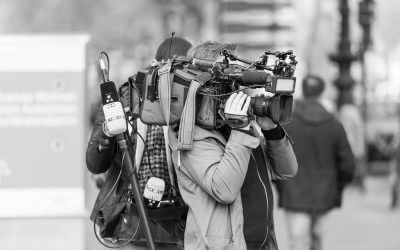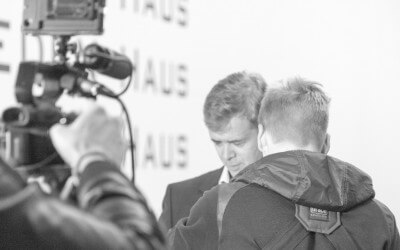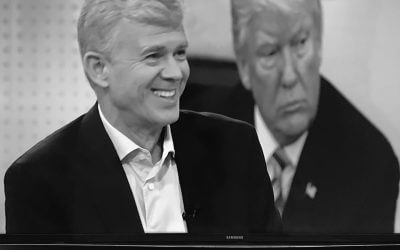How do you appear in front of the camera?
Be prepared!
Overview
- Get in front of the camera sooner rather than later
- Between us …
- Appearance in front of the camera
- The actual situation: how you are seen in front of the camera
- P.S.
- Comments
- Related articles
Get in front of the camera sooner rather than later
In the age of digitalization, video conferences and video contributions are playing an increasingly important role in communication. Where large events used to be held live, often in many locations, to get messages across to target groups, this is increasingly being done using video.
Social media, such as YouTube™, have developed into very successful communication platforms. What used to be the exception is becoming the norm. However, even the seemingly playful use of widespread technology requires knowledge, skills and preparation. Many contributions show that not everyone should spontaneously step in front of the camera. Many people harm themselves with their appearances and do not seem to be aware of this.
There are numerous examples of the fact that the best intentions are not always enough to present your own personality and content convincingly in front of the camera. What used to mature as a speech or presentation in a small group with repetition is now broadcast to the whole world.
Between you and me …
I myself have stood in front of the camera countless times and cut quite a good figure. Otherwise, I wouldn’t have been booked and rewarded repeatedly. I assumed I had mastered it. But when I wanted to take on all the roles (of sound assistant, cameraman, presenter and protagonist) on my own in front of the camera, I was in a beginner’s position. And that despite all my experience in front of and behind real cameras. I deliberately leave this evidence on the Internet and hope the development is recognizable. Although, the stage usually belongs to my clients.
Your appearance in front of the camera is important
If you want to develop your personal impact in front of the camera, it is best to start by taking a closer look at your current impact. Much of what applies to convincing conversations and presentations also applies here. But there are other peculiarities.
Today’s variety of cameras and media technology makes things more difficult. In the past, the bigger the camera, the more important it was. This can be completely different today. This creates additional uncertainty. There is already enough to consider, and other aspects don’t exactly make presence and persuasiveness any easier.
How you appear in front of the camera
How convincing are you and your messages in front of the camera? 112 factors play a key role? I have been analyzing speeches since 1998. Having analyzed 16,749 speeches and presentations to date, as well as many video contributions, I can say very precisely what has what effect on which audience. Let me give you the feedback that will help you move forward. You will receive basic feedback and recommendations, as well as the impetus you need to be convincing for specific appearances in front of the camera.
Support for your media presence
>You want to make the most of the opportunity. Do you want to face the questions and give convincing answers? Then I can help you prepare for your media appearance.
You decide on the extent of the support. My recommendation: Give yourself and your audience at least one rehearsal with professional feedback. Then you will know for yourself how you and your answers affect your target group, what you should and shouldn't do, where there is potential. Why wait until after you've performed to get such feedback? It's too late to correct. Then it is too late to correct. Cross-fire interviews in particular are very intense, and you only have the opportunity to look at the results afterward.
What does this professional support cost? The fees are listed here. You know best how much it will cost compared to the expected benefit. Take advantage of it. By the way, this can also be done with sessions via telephone or video support.
By the way, many people suffer from severe stage fright when they appear in the media and suffer through the performance. That's a shame, because with the right help, it's not necessary. Just in case ...
Just ask me personally
Please post any questions that may be of interest to other readers in the comments. Looking for professional help?
If you are interested in coaching, training or consulting, if you have organizational questions, or if you want to make an appointment, you can reach me best via this contact form (you can choose whether you want to enter your personal data) or via e-mail (mail@karstennoack.com). The privacy policy can be found here.
Transparency is important. That is why you will find answers to frequently asked questions already here, for example about me (profile), the services, the fees and getting to know me. If you like what you see, I look forward to working with you.
Remarks:
In the address bar of your browser, the URL should begin with "https://www.karstennoack.com/...". This indicates a secure connection (SSL). Whether you enter your real name is up to you.
Essential recommendations for media interviews
What you should keep in mind when being interviewed by the media. Here you will find 19 basic recommendations to help you and your message to be compelling in the media.
26 tips for mastering television interviews
Most of the time it happens unexpectedly. That’s why you’ll find tips for preparing for and participating in television interviews here.
Body language expert explains Trump’s awkward day at the NATO Summit
It may be mere speculation that Donald Trump is compensating for something. Yes, certain behavior may give that impression. Let me analyze Donald Trump’s body language when he met Angela Merkel, Emmanuel Macron, Duško Marković and other leaders at the NATO-Summit in Brussels.

This article is a short excerpt from the more comprehensive course materials my clients receive in a group or individual training or coaching.
Published: June 21, 2008
Author: Karsten Noack
Revision: August 20th, 2023
Translation: ./.
German version:
K:
H:
T: RR
#234



0 Comments